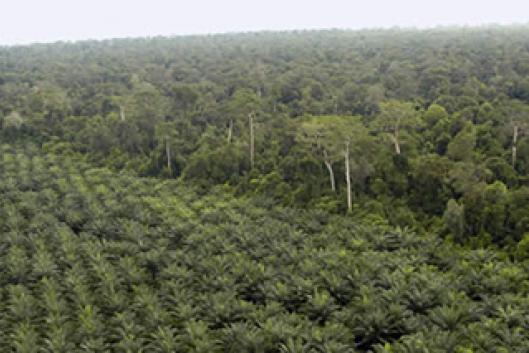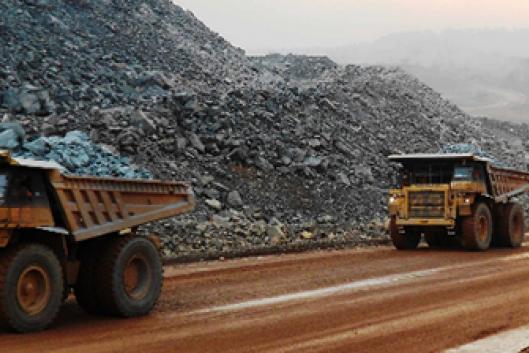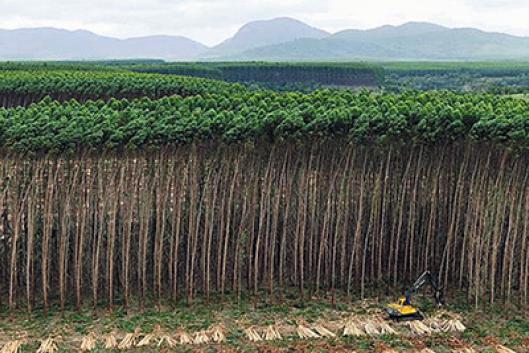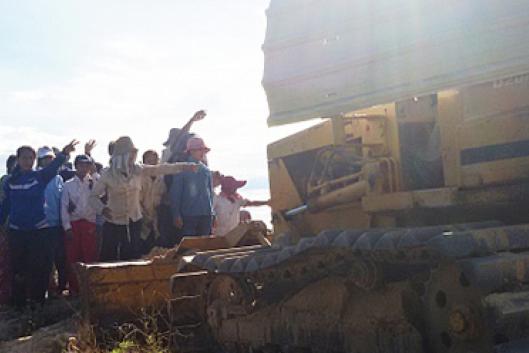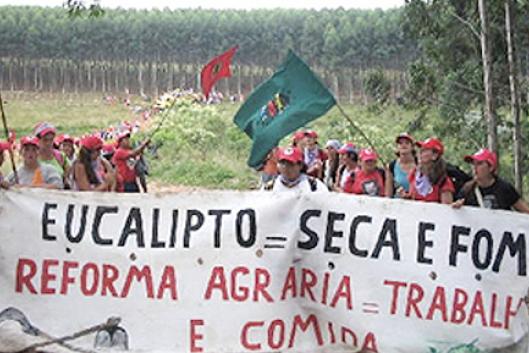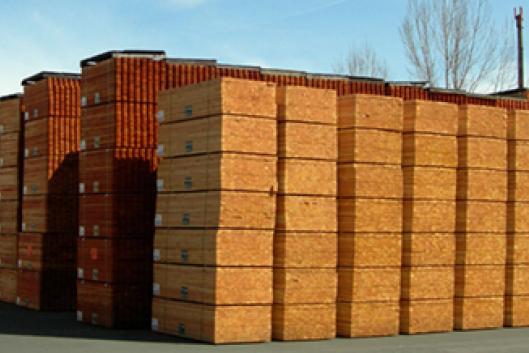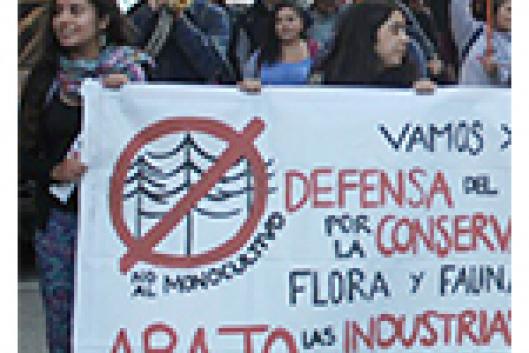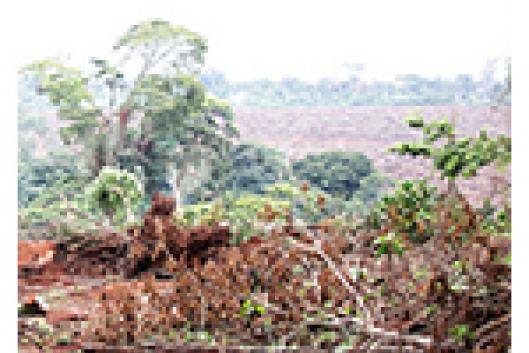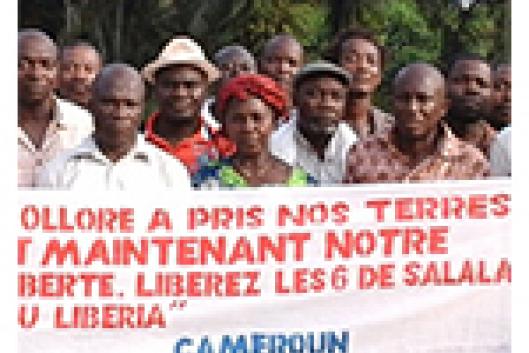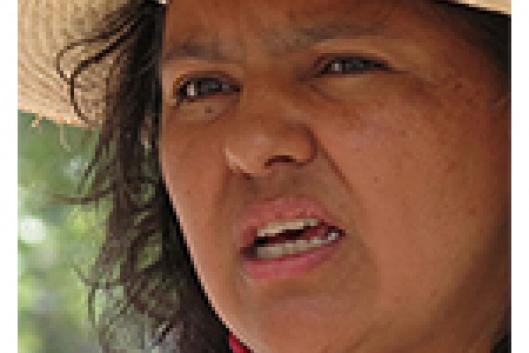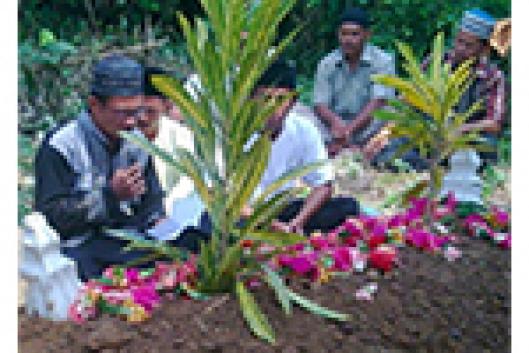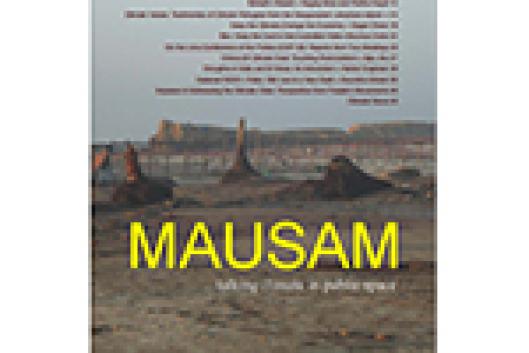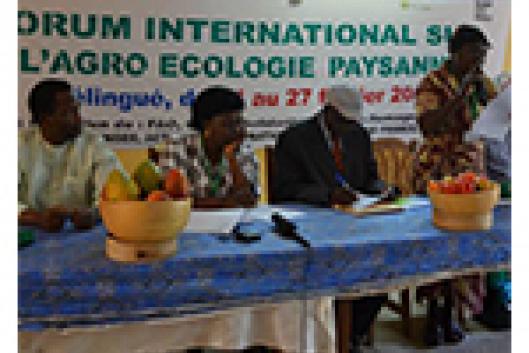Bulletin Issue 213 – April 2015
Grabbing and accumulating under "green" capitalism: more pressure on communities' territories
WRM Bulletin
213
April 2015
OUR VIEWPOINT
GRABBING AND ACCUMULATING UNDER "GREEN" CAPITALISM: MORE PRESSURE ON COMMUNITIES' TERRITORIES
-
6 May 2015A piece of news circulating in Brazil in 2013 appeared odd at first glance: Fibria, one of the world's largest producers of pulp wood from eucalyptus monocultures, owner of nearly 1 million hectares of land in Brazil, sold 210 thousand hectares of "its" land to Parkia Participações. When Brazilian press reported the transaction, the company stated it was considering selling almost half of its land in Brazil, i.e. about half a million hectares (1) in a similar fashion. Thus, questions arose, such as, why would a company which – like its peers - had previously always sought to seize more and more land to expand its eucalyptus plantations, be willing to let go of the land? How does this work?
-
6 May 2015Violent, systematic grabbing of peasants and indigenous peoples’ territories in Cambodia is resulting in a threefold increase in the number of families affected by land conflicts during 2014 when compared to the previous year (1). The Cambodian League for the Promotion and Defense of Human Rights (LICADHO) launched a “land concession dataset” in March 2015, showing the vast areas of corporate seizure and use of land in Cambodia (2). Further, areas under a REDD project claiming to “preserve” communal forests in the country are being cleared and communities being displaced in order to “open up” space for private profits.
-
6 May 2015As expected and despite the strong national and international opposition, on April 9, the Brazilian National Technical Commission on Biosafety (CTNBio) approved the commercial use of a genetically modified (GM) variety of eucalyptus. The request was made by the company FuturaGene, a subsidiary of the giant Suzano Pulp and Paper. CTNBio’s decision made Brazil the first country worldwide to approve a variety of GM eucalyptus, setting off alarm in the country and in the Latin American region.
-
6 May 2015For a long time, WRM, along with other organizations and social movements, has denounced the certification of projects that are destructive to forests and their web of life. These projects have also proven to be detrimental to communities living in and depending on forests. The Forest Stewardship Council (FSC) certification not only legitimates industrial logging in tropical forests and vast areas of monoculture plantations, but has also been associated with carbon markets, by certifying trees planted for “carbon capture".
PEOPLES IN ACTION
-
6 May 2015Forest fires in the south of Chile have been very aggressive this year, affecting thousands of hectares of forests from three protected areas in the Araucanía region, south of Chile. On April 14th, a march was organized to denounce the root of the problem: the expansion of the forestry industry. The high concentration of land property and the intensive use of agrotoxics, together with the precarious working conditions for the majority of workers in the industry contribute to generating poverty and misery in the territories where these tree monocultures have impeded the existence of other ways of survival. The march denounced that it is not enough to put out fires.
-
6 May 2015The radio program Growing Voices, from Radio Mundo Real, discusses the impacts of the highly criticized Wilmar International, one of the largest palm oil corporations in the world. The program looks closer at the case of Kalangala in Uganda, where over one-hundred Ugandan small-scale farmers were evicted, and their lands grabbed by Oil Palm Uganda Limited, a subsidiary of Bidco Uganda Ltd - which in turn is a venture co-owned by Wilmar International. Farmers have presented a lawsuit in March 2015, claiming compensation for their lost lands and the damages caused.
-
6 May 2015Peasant farmers deprived of their lands launch a series of occupations on Socfin’s plantations in Cameroon, Liberia, Cambodia and Côte d’Ivoire between the end of April 2015 and the annual shareholder meetings of the Socfin group (27 May) and the Bolloré group (4 June). The Bolloré group is the biggest shareholder (39%) of Socfin, which has industrial oil palm and rubber plantations, among others in the countries where the protests are taking place. Since 2008, the expansion of these plantations has intensified.
-
6 May 2015In a country with growing socioeconomic inequality and human rights violations, Berta Cáceres played a key role in the struggle of the indigenous lenca peoples of Honduras against the construction of a mega-dam that would destroy the Rio Blanco. She undertook a grassroots campaign with the local communities and led a protest where people peacefully demanded their rightful say in the project. Against all odds, Cáceres and the lenca communities' efforts successfully kept construction equipment out of the proposed dam site. Despite the risks and constant death threats, Cáceres maintains a public presence in order to continue her work.
RECOMMENDED
-
6 May 2015The opinion article from the Jakarta Post by Abetnego Tarigan, of the Indonesian NGO Walhi, and Iwan Nurdin, of the Agrarian Reform Consortium, warns on how the international focus on the impacts of plantation companies has been on their environmental impacts rather than their human rights abuses. They explain how the recent torture and murder of Indra Pelani amounts to an entrenched industrial plantation system whereby whole swaths of rural land have been taken from locals without their consent. Companies have militarized the protection of their plantations and their armed guards routinely act violently and with impunity.
-
6 May 2015The India Climate Justice collective has published the third issue of the Mausam magazine aiming to facilitate constructive and creative debates on climate issues. It attempts to connect these issues to local struggles over natural resources, fossil fuel extraction, lands, livelihoods and food sovereignty. The magazine reports on how environmental regulations and legislation have been dismantled by the current government; how communities are already struggling with the realities of a climate-changed world; how India's REDD+ strategy has at its core the reliance on money coming from carbon markets, which may trickle down to the people who depend on forests; how the climate negotiations affect India; among others.
-
6 May 2015More than 200 people took part in the Forum, held in Nyéléni, Mali, from February 23 to 27, to develop joint strategies to promote agroecology and defend it from corporate co-option. The declaration of the Forum affirms that “Agroecology is political; it requires us to challenge and transform structures of power in society. We need to put the control of seeds, biodiversity, land and territories, waters, knowledge, culture and the commons in the hands of the peoples who feed the world,” and calls for an immediate transformation based on truly agroecological food production by peasants, artisanal fisherfolk, urban farmers etc.
